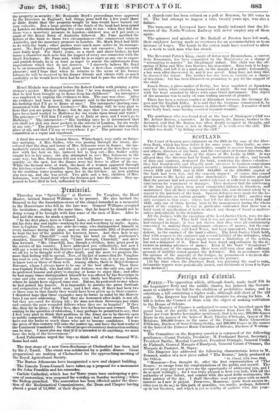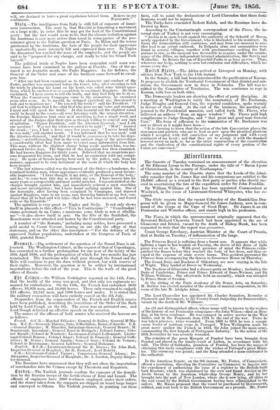• lorrigu anti NEAL firnurr.-41e opposition which, although dumb, made
itself felt la the Legislative Body and the middle classes, has induced the Govern- ment to withdraw the bill for the abolition of prohibitive duties, and to substitute a bill containing a higher scale, although still short of the old scale. The Emperor has found the protectionists too strong for him.
bill is before the Council of State with the object of making restittitien_ to the House of Orleans. " The Minister of Finance is authorized to cause to be inscribed upon the
grand book of the public debt, with jouissance from June 22, 18o6, the Three per Cent-Rentes hereinafter mentioned, that is to-say, 200;000 francs Rents in the names of the heirs of Marie Therese d'Orleans, Queen of the 'Belgians, 200;000 francs in the name of the Princess Marie Clementine • -d'Orleans, Duchess of Saxe-Coburg-Gotha, and 200,000 francs in the names of the heirs of the Princess Marie Christine of Orleans, Duchess-of Wurteni- bemo The Committee on the Regency question is composed of the following- gentlemen—Couht Tortalis, President; M. Ferdinand Barrot, Secretary ; President 'Barth°, Marshal Canrobert, President Delangle, General Coutitt de Flahault, General Marquis d'Hautpoul, General Count d'Ornium, the -Marquis de Pastoret, M. Sapey. The Emperor has addressed the following characteristic letter to IL -Ponsard, author of a-new piece called " The Bourse," lately produced 'at the Odeon. " St. Cloud, 15th June 1856. "Monsieur—You thought fit, after the first representation of "Ile Bourse,' to escape from the congratulations of the public and myself. The receipt of your play now gives me the opportunity-of addressing you, and I do-so most willingly • for I was trely.pleased to hear you lash, with all the authority of your talent, and combat-with the most noble sentiments, tfie fatal passion of. the day. I shall therefore read your piece with es much interest as I-saw. it- played. Persevere, Monsieur, (your fresh success in- yites.you to do so,) in this .path of monaity, .too• rarely, perhaps, followed up in our theatres, and which is yet so worthy of authors who, like your-
self, are destined to leave a great reputation behind them. Believe in my
sentiments. NAPOLEON."
14.-The intelligence from Italy is still full of rumours of immi- nent insurrection. The story is, that Mazzini is fomenting a movement on a large scale, in order that he may get the lead of the Constitutional party : but the fact would seem to be, that the chronic irritation against the Austrians is now more active than usual in consequence of the pro- minence given to the Italian question at Paris. In Milan and the towns garrisoned by the Austrians, the hate of the people for their oppressors is undoubtedly more intensely felt and expressed than ever. In Naples the discontent has reached the mass of the employes, and the people are said to be "prepared for any change, and ready to take the Grand Turk himself."
The political trials at Naples have been suspended until some wit- nesses have been examined in the galleys at Procida. One of the ac- cused is an Augustin monk, the Padre Ruggiero. In his defence, the General of the Order and some of his brethren came forward to excul- pate him.
" After one had been examined as to the character and conduct of the Padre, another was summoned before the Court, who, after swearing to tell the truth by placing his hand on his heart, was asked some trivial ques- tions, which he answered so as completely to exculpate Ruggiero. He then exclaimed, I have sworn to tell the truth, and may God help me to do so. When the Commissary Campagna came to the monastery, he examined room after room. As to myself, he stripped (unrobed) me, threatened to lash and to imprison me." Do you tell the truth ? ' said the President. 'I call God to witness that I do—that God who gave me my voice and strength. I must and will speak the truth.' At this moment not the slightest sound could be heard in the court—all were listening with the utmost attention : the Foreign Ministers bent over as if unwilling to lose a single word, and several of the Judges shut their eyes as though willing to conceal any sign of agitation. Signor President,' said the Attorney-General, may I ask one question ? Was not the witness reputed to be mad ? "Mad ! ' sneered the monk ; yes, I had a fever some five -ears ago.' I never heard that he was mad,' said another monk. I was informed that he was mad,' said the Attorney-General, and that it would be unnecessary to take his depo- sition,'—notwithstanding that in the very earliest stage of the proceedings a considerable effort had been made to extort some information from him. This man, without the slightest charge being made against him, was im- prisoned twelve days. The Superior of the Augustins was then examined. He had known Ruggiero for thirty years. Believed that no suspicions per- sons frequented his room, and that he had no connexion with any conspi- racy. He spoke of threats having been used by the police, and, from his manner, appeared to be very indignant at the mode in which the body had been treated.
"The last witness called was the General of the Order—a handsome, de- termined-looking man, whose appearance evidently produced a most favour- able impression. ' I have thought it my duty, as the General of the body,' said he, to come here this day to defend my son. I have known him for many years as a respectable and most useful member. I was astonished at the charges brought against him, and immediately ordered a most searching and secret investigation ; but I have found nothing against him. One of the fraternity, after having been examined by Campagna, and deposed against Ruggiero' came to my room, and, throwing himself at my feet, con- fessed that all he had said was false—that he had been menaced, and feared exile or the Ergastolo.'"
The agitation is very great in Naples and Sicily. It not only shows itself in placards to this effect—" Viva in Costituzione !" " Concittadini ! siamo governati da un Caino, e moriremo come Abele se non ci ribellia- mo "—it also shows itself in acts. On the fête of the Sanfedisti, the Reactionists were attacked and beaten by the Constitutional party.
A number of " the Romans," including many nobles, have presented a gold medal to Count Cavour bearing on one side the effigy of that statesman, and on the other ills inscription—" For the defence of the oppressed Italian populations, undertaken at the Congress of Paris of 1856, grateful Rome."
ilnitank.—Thg settlement of the question of the Sound Dues is ad- journed. The Washington Cabinet, at the request of that of Copenhagen, has consented to a further prolongation for one year of the treaty of the 28th April 1856, and the prolongation of which for two months has just terminated. The Americans who shall pass through the Sound and the Belts will continue to pay the dues without protest, but with reserve of their rights. Moreover, the question is to be settled by international negotiations before the end of the year. This is the work of the good offices of Russia.
ttt TiMPa.Sir William Codrington reported on the 14th June, that the health of the army was good, and that only ten regiments re- mained for embarkation. On the 13th, the French had embarked 3620 officers, 93,826 men, and 16,046 horses. There only remained to embark 731 officers, 22,942 men, and 7200 horses and mules. It is stated that the military evacuation will have entirely ceased on the 5th July.
Despatches from the commanders of the French and English armies have been published, describing the investiture of the Order of the Bath held by Lord Gough on the Gth. The scene was an animated one, and Lord Gough delivered an effective speech on the occasion.
The names of the officers of both armies who received the honour are as follows.
Preach. G.C.B.—Marshal Pelissier General de Sallee; General M'Ma- hon. K.C.B.—Generals Thierry, Pate, 'd'Ilerbillon Bouat, d'Aurelle. C.B. —General Bazaine ; M. Blanchot, Intendant-General; General Beuret ; M. Bondurand, Intendant ; General Borel de Bretigels ; Colonel Jarras; Colo- nel Basalt ; Colonel de Waubert ; Lieutenant-Colonel Lallemand ; Lieute- nant-Colonel Renson ; Colonel Anger; Colonel de Francois; General Caffi- ni4es -2M. Serine ; General Jannin ; General Goze ; Colonel de Vernon; Colonel de Bentzmann ; General Lefebvre ; General Duhesme. K.C.B.—Lieutenant-General Sir R. Daeres ; Sir John Hall, Inspector-General of Hospitals ; Sir H. Barnard; Lord Bokeby. C.B.—Lieutenant-Colonel Turner ; Commissary-General Adams - Dr. Alexander, Inspector-General of Hospitals; Dr. A. Gordon, Deputy-Inspec- tor-General.
The Russians have announced that they will not allow the importation of merchandise into the Crimea except by Theodosia and Eupatoria.
iturkt4.—The Turkish journals confirm the rumours of the demoli- tion by the Russian troops of the fortifications of Reni and Ismail. The officers of engineers have 2000 workmen employed under their orders, and the stones taken from the ramparts are shipped on board large barges and conveyed to Odessa. The Turkish journals, in pointing out these
facts, call to mind the declarations of Lord Clarendon that these forti- fications would not be injured. The Turks have evacuated Redout Kaleh, and the Russians have de- livered up Kars.
According to the Constantinople correspondent of the Times, the in- ternal state of Turkey is not very encouraging.
"Arabia is in open revolt against the authority of the Scheriff of Mecca, newly appointed by the Government, who is blockaded in his residence. In Syria the fermentation still continues, and may from one moment to ano- ther lead to an actual outbreak. In Bulgaria arms and ammunition were found in several villages, together with proclamations exciting the Bul- garians to rise, as the moment was favourable to acquire, under the counte- nance of the Allies, an independent internal administradon, like Servia and Wallachia. In Bosnia the son of Kurschid Pasha is as busy as ever. Thus, wherever one looks, nothing is seen but confusion and difficulties, which in- crease every day."
Stem—The Africa arrived at Liverpool on Monday, with advices from New York to the 11th instant.
In the Senate, a bill had been introduced:for the pacification of Kansas It proposes to abolish the Territorial Government of that district and sub- stitute the Government now in force in Nebraska. The bill was re- mitted to the Committee of Territories. The war continues to rage in Kansas, with loss on both sides.
The Democratic leaders are showing the effect of party discipline. At a meeting at Washington to ratify the nomination of Mr. Buchanan, Judge Douglas and General Cass, the rejected candidates, spoke warmly in favour of their rival. At the end of the business, the meeting ad- journed to the Presidential mansion, and called forth Mr. Pierce, who delivered an address " from an upper window." Mr. Pierce paid high compliments to Judge Douglas, and " that great and good man General Cass." His form of adhesion to the nomination of Mr. Buchanan was not so direct as it might have been- " It is cheering to know that the action of the late Convention places the statesmen and patriots who are to lead us now upon the identical platform which I accepted, with full conviction of my judgment and with every sentiment of my heart ; and that they are to occupy it with the standard lowered never an inch, so far as the strict construction of the constitution and the vindication of the constitutional rights of every portion of the Union are concerned."



























 Previous page
Previous page